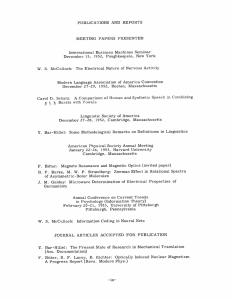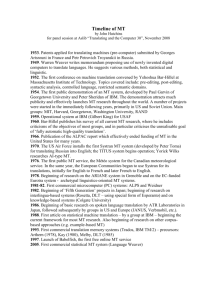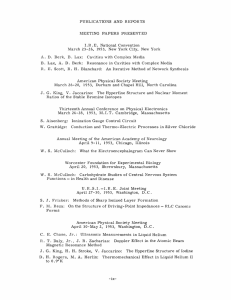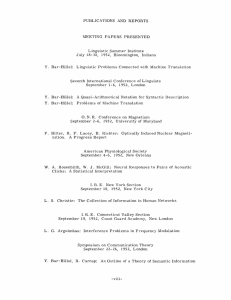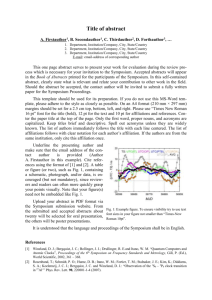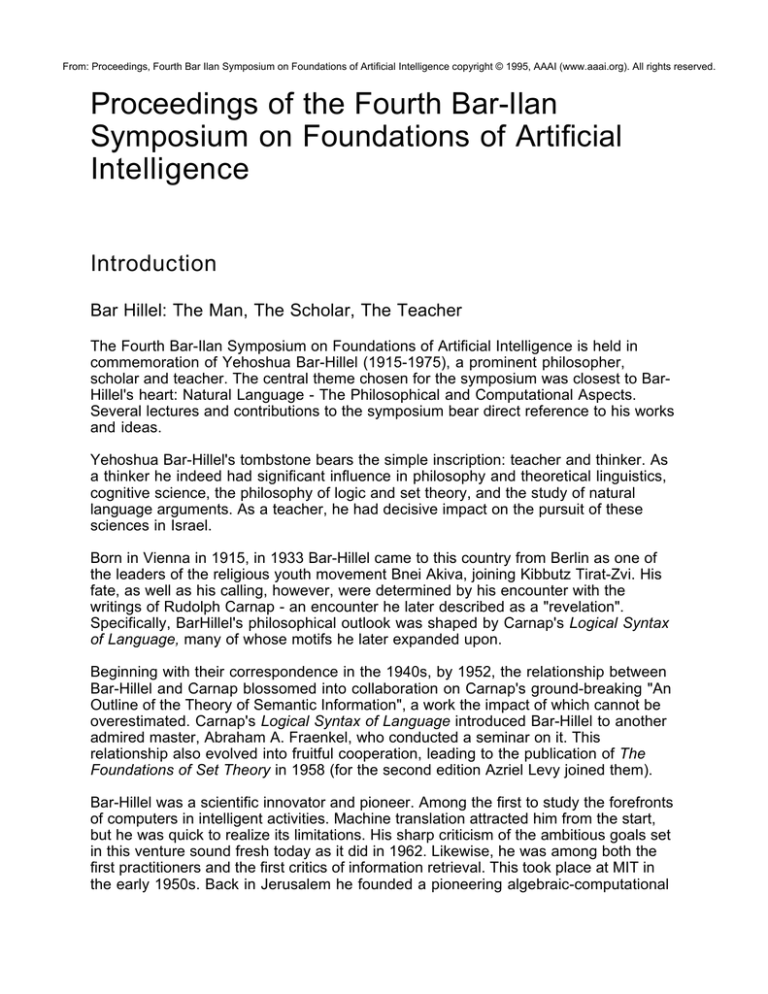
From: Proceedings, Fourth Bar Ilan Symposium on Foundations of Artificial Intelligence copyright © 1995, AAAI (www.aaai.org). All rights reserved.
Proceedings of the Fourth Bar-Ilan
Symposium on Foundations of Artificial
Intelligence
Introduction
Bar Hillel: The Man, The Scholar, The Teacher
The Fourth Bar-Ilan Symposium on Foundations of Artificial Intelligence is held in
commemoration of Yehoshua Bar-Hillel (1915-1975), a prominent philosopher,
scholar and teacher. The central theme chosen for the symposium was closest to BarHillel's heart: Natural Language - The Philosophical and Computational Aspects.
Several lectures and contributions to the symposium bear direct reference to his works
and ideas.
Yehoshua Bar-Hillel's tombstone bears the simple inscription: teacher and thinker. As
a thinker he indeed had significant influence in philosophy and theoretical linguistics,
cognitive science, the philosophy of logic and set theory, and the study of natural
language arguments. As a teacher, he had decisive impact on the pursuit of these
sciences in Israel.
Born in Vienna in 1915, in 1933 Bar-Hillel came to this country from Berlin as one of
the leaders of the religious youth movement Bnei Akiva, joining Kibbutz Tirat-Zvi. His
fate, as well as his calling, however, were determined by his encounter with the
writings of Rudolph Carnap - an encounter he later described as a "revelation".
Specifically, BarHillel's philosophical outlook was shaped by Carnap's Logical Syntax
of Language, many of whose motifs he later expanded upon.
Beginning with their correspondence in the 1940s, by 1952, the relationship between
Bar-Hillel and Carnap blossomed into collaboration on Carnap's ground-breaking "An
Outline of the Theory of Semantic Information", a work the impact of which cannot be
overestimated. Carnap's Logical Syntax of Language introduced Bar-Hillel to another
admired master, Abraham A. Fraenkel, who conducted a seminar on it. This
relationship also evolved into fruitful cooperation, leading to the publication of The
Foundations of Set Theory in 1958 (for the second edition Azriel Levy joined them).
Bar-Hillel was a scientific innovator and pioneer. Among the first to study the forefronts
of computers in intelligent activities. Machine translation attracted him from the start,
but he was quick to realize its limitations. His sharp criticism of the ambitious goals set
in this venture sound fresh today as it did in 1962. Likewise, he was among both the
first practitioners and the first critics of information retrieval. This took place at MIT in
the early 1950s. Back in Jerusalem he founded a pioneering algebraic-computational
From: Proceedings, Fourth Bar Ilan Symposium on Foundations of Artificial Intelligence copyright © 1995, AAAI (www.aaai.org). All rights reserved.
linguistic group which attracted some of the best young mathematicians of the time
Shamir, Gaifman and Perles. Bar-Hillel brought scientific progress and openmindedness to our country. He was the first to teach the theory of games at the Hebrew
University.
In 1964 Bar-Hillel published "Language and Information", a selection of papers he
wrote by himself and with co-authors. The introduction to this book (published by
Addison-Wesley and The Jerusalem Academic Press) is a lucid scientific and
personal autobiography.
Yehoshua Bar-Hillel was well-known internationally and served as president of the
International Association of Logic, Methodology and Philosophy of Science from 1966
to 1968. He was a popular figure and sought-after lecturer at conferences, where he
excelled as a polemicist. His participation never failed to generate interest and
excitement. Bar-Hillel was thus at least as influential as a speaker as he was in writing.
Dialogue with Bar-Hillel was a challenge, compelling his interlocutors to hone their
arguments and exercise the utmost intellectual honesty. Once, after patiently listening
to a pompous political scientist lecture on the future of the two-party system in the
United States, he stood up during the question period and asked: Would it be fair, sir,
to sum up your lecture by saying that the two-party system in the U.S. will continue to
exist until a third party comes along? He was Socratic in his relentless criticism of all
claims to expertise, while genuinely respectful of any demonstrated instance of it.
What Heinz said of Berlioz was true of Bar-Hillel: his genius outstripped his talent. He
was possessed of a remarkable gift for formulating clearly philosophical problems and
research programs, the treatment of which required mathematical tools not always
available to him. As a result, credit for important research which he was the first to think
up sometimes went to others. For example, what is known as "Montague grammar" is
to a large extent Bar-Hillel's brain-child (the form of the grammar, the treatment of
indexicals), though he was not quite able to work the program out in detail.
Bar-Hillel was a fighter, both literally - as a volunteer in the Jewish Brigade in World
War II and as a soldier who lost an eye in Israel's War of Independence - and as one
who fought a lifelong battle against the forces of darkness. Those who knew his
intolerance of vagueness know how hard he fought to distinguish between
enlightenment and darkness.
Impatient with muddled thinking and at the same time encouraging of talent, Bar-Hillel
was an exciting teacher and scholar. He left us much too early, in 1975, when he was
only sixty.This volume comprises the proceedings of the symposium held June 20-22,
1995 in Ramat Gan and Jerusalem, Israel. The proceedings focuses on the
philosophical and computational aspects of natural languages and artificial
intelligence.
His legacy is alive with us.

